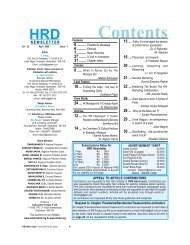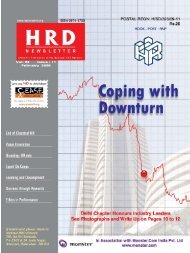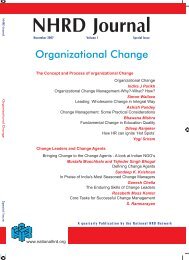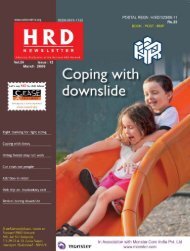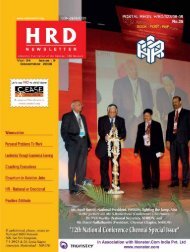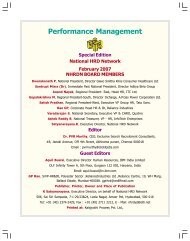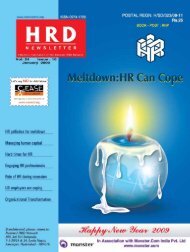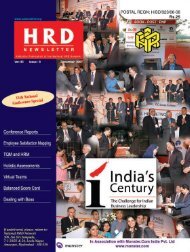5 ........................Chennai Chapter Report 6 ... - National HRD Network
5 ........................Chennai Chapter Report 6 ... - National HRD Network
5 ........................Chennai Chapter Report 6 ... - National HRD Network
You also want an ePaper? Increase the reach of your titles
YUMPU automatically turns print PDFs into web optimized ePapers that Google loves.
Let me begin by making a confession. I<br />
had one strange, if not weird habit. I used<br />
to go through telephone directories as a<br />
favorite pass time. However, I wanted to get<br />
rid of this habit. So I settled for going through<br />
dictionaries, rather than directories. I read<br />
a variety of dictionaries, Urdu - Hindi, English<br />
- English, English - French, Hindi - English<br />
etc. My vocabulary did not improve, as is<br />
evident from the limited numbers of words<br />
that I use for writing these columns, but my<br />
knowledge about existence of the variety of<br />
dictionaries definitely improved. I realized<br />
that there are dictionaries of different<br />
disciplines available, and by some chance<br />
one day, I found myself sitting with the<br />
dictionary of psychology in my hands. With<br />
some curiosity, I opened it, started flipping<br />
through it, and then suddenly, thought that<br />
I should look at some words that I always<br />
use in general conversation but am not really<br />
sure of the exact dictionary meaning of the<br />
same. The first word that I looked for was<br />
"hope." To my surprise I did not find any<br />
entry for that. This increased my curiosity,<br />
and I looked for "optimism." Same result. I<br />
tried, "resiliency." No result. Looked at<br />
"Gratitude." No result. I thought, let me give<br />
it an easy one, and I tried, "Happiness." And<br />
believe me; I was surprised to find that there<br />
was no entry against that also.<br />
I thought that I would try to look at some<br />
thing negative now, and soon I was<br />
bombarded with words which I could not<br />
even pronounce, and could not spell<br />
properly without the help of spell check.<br />
Involutional melancholia (this I had to add<br />
to my spell check dictionary), Schizophrenia<br />
(29-entries over four pages),<br />
dysdiadochkinesia, adiadochkinesia, (these<br />
two also have to be added to my spell check<br />
dictionary); I got adequate definitions,<br />
meanings and illustrations for such<br />
terminology. Emboldened now, in the belief<br />
that I am on to some thing, albeit<br />
accidentally, I tentatively moved toward web<br />
search (of course with the help of my<br />
daughter Jaya). I looked at the listed topics<br />
for discussion, and glossary on some<br />
psychology sites, and again got the similar<br />
results.<br />
The narration of this chain of events is not<br />
the accounts of an eccentric and habitual<br />
and compulsive directory/ dictionary reader,<br />
Character Strengths and<br />
Virtues: An Introduction - I<br />
[Psychology of weakness and Psychology of strengths]<br />
Column<br />
but a reflection on the direction that the field<br />
of psychology had taken during the past five<br />
decades.<br />
A search by Luthans (2002) of contemporary<br />
literature in psychology as a whole found<br />
approximately 200,000 published articles on<br />
the treatment of mental illness; 80,000 on<br />
depression; 65,000 on anxiety; 20,000 on<br />
fear; and 10,000 on anger; but only about<br />
1000 on positive concepts and capabilities<br />
of people.<br />
Let us examine, what it means!<br />
The good news is that it signifies the<br />
tremendous strides that we have made in<br />
the areas of mental disorders, and illness.<br />
To quote Peterson and Seligman (2004;<br />
page 3):<br />
"In recent years, strides have been made in<br />
understanding, treating, and preventing<br />
psychological disorders. Reflecting this<br />
progress and critically helping to bring it<br />
about are widely accepted classification<br />
manuals - the Diagnostic and Statistical<br />
Manual of Mental Disorders (DSM)<br />
sponsored by the American Psychiatric<br />
Association (1994) and the International<br />
Classification of Diseases (ICD) sponsored<br />
by the World Health Organization (1990) -<br />
which have generated a family of reliable<br />
assessment strategies and have led to<br />
demonstrably effective treatments for more<br />
than a dozen disorders that only a few<br />
decades ago were intractable."<br />
However, the focus of psychology, in the<br />
process had become almost lop sided.<br />
Psychology had always had three missions:<br />
Trying to repair damages, prevent problems,<br />
and build strengths in people. Over the<br />
years, society in general and research<br />
funding sources in particular promoted<br />
concern with what was wrong with people.<br />
Almost exclusive attention in research and<br />
practice became devoted to how to fix and<br />
treat psychological problems and<br />
weaknesses (Luthans, 2002). The pursuit<br />
of damage repair happened at the expense<br />
of the other two missions of psychology.<br />
– Dr Jaydeep Lal<br />
To quote from Seligman and<br />
Csikszentmihalyi (2000; page 5):<br />
"Psychology since World War II has become<br />
a science largely about healing. It<br />
concentrates on repairing damage within a<br />
disease model of human functioning. This<br />
almost exclusive attention to pathology<br />
neglects the fulfilled individual and a thriving<br />
community. The aim of Positive Psychology<br />
is to begin to catalyze a change in the focus<br />
of psychology from preoccupation only with<br />
repairing the worst things in life to also<br />
building the best qualities."<br />
They suggested that psychology neglected<br />
the possibility that building strength is the<br />
most potent weapon in the arsenal of<br />
therapy, and to redress the previous<br />
imbalance, we must bring the building of<br />
strength to the forefront in the treatment and<br />
prevention of mental illness.<br />
In fact way back in 1954 itself, Maslow<br />
was airing a similar opinion. To quote<br />
Abraham Maslow, (1954: Page 354):<br />
"The science of psychology has been far<br />
more successful on the negative than on<br />
the positive side; it has revealed to us much<br />
about man's shortcomings, his illness, his<br />
sins, but little about his potentialities, his<br />
virtues, his achievable aspirations, or his full<br />
psychological height. It is as if psychology<br />
had voluntarily restricted itself to only half<br />
its rightful jurisdiction and that the darker,<br />
meaner half…. We must find out not only<br />
what psychology is but what it ought to be,<br />
or what it might be, if it could free itself, from<br />
the stultifying effects of limited, pessimistic,<br />
and stingy preconceptions about human<br />
nature."<br />
Thus, this much keenly observed, realization<br />
that psychology is not only about weakness<br />
correction, or illness curing and healing, it<br />
is also about making normal people stronger<br />
and more productive and making high<br />
human potential actual, led to the<br />
development of the discipline of positive<br />
psychology, wherein Peterson and<br />
Seligman (2004) developed their<br />
classification of character strengths and<br />
virtues.<br />
How this emphasis moved totally in favor of<br />
repairing damage, and almost nothing else,<br />
has been described in the most In the second part of this essay we will<br />
comprehensive manner by Seligman and discuss about the differences between<br />
Csikszentmihalyi (2000).<br />
strengths and talents.<br />
H<br />
Dr. Jaydeep Lal, Head- iGATE Center for OD & Leadership, iGATE Global Solutions Limited, Bangalore, e-mail: jaydeep.lal@igate.com<br />
| <strong>HRD</strong> News Letter | April 2008, Vol.24, Issue:1 13




